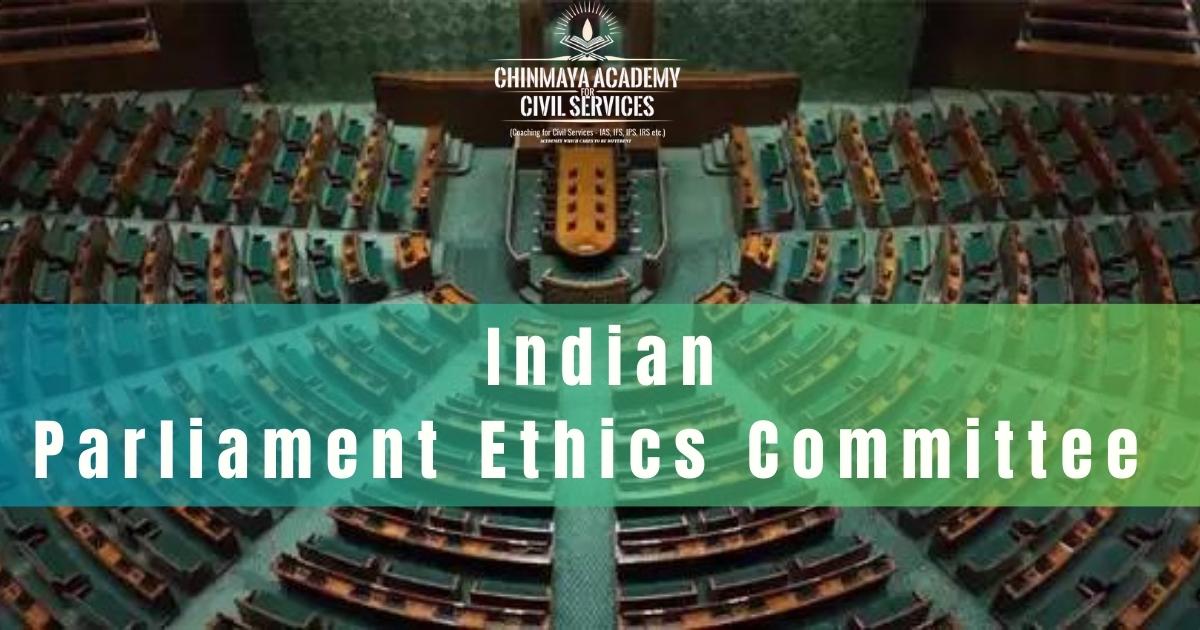The Parliament Ethics Committee is a grouping in the Parliament of India that is responsible for overseeing the moral and ethical conduct of its members.
It was constituted in 1997, following the Presiding Officers Conference held in New Delhi in October 1996, which desired the legislatures to explore the possibility of constituting Ethics Committees.
- The Ethics Committee is composed of 15 members, 10 of whom are elected by the Lok Sabha and 5 of whom are elected by the Rajya Sabha.
- The Committee is chaired by a senior member of Parliament who is nominated by the Speaker of the Lok Sabha and the Chairman of the Rajya Sabha in consultation with the leaders of the various political parties.
The Ethics Committee can investigate any complaint of unethical conduct against a member of Parliament, either on its own initiative or on a complaint received from a third party.
- The Committee has the power of a civilcourt to summon witnesses and to examine documents.
- After completing its investigation, the Committee submits a report to the House of Parliament concerned, which may then take appropriate action against the member in question.
The Ethics Committee has played an important role in upholding the standards of ethical conduct in the Parliament of India. It has investigated a number of complaints against members of Parliament, including allegations of corruption, misuse of office, and personal misconduct. The Committee has also recommended a range of penalties against members of Parliament found to have violated ethical standards, including expulsion from the House.
Difference between Lok Sabha and Rajya Sabha Ethics Committees
The Lok Sabha and Rajya Sabha Ethics Committees are similar in many ways. However, there are a few key differences between the two committees.
Lok Sabha Ethics Committee |
Rajya Sabha Ethics Committee |
| The Lok Sabha Ethics Committee is composed of 10 members | The Rajya Sabha Ethics Committee is composed of 5 members |
| The Lok Sabha Ethics Committee is chaired by a senior member of Parliament who is nominated by the Speaker of the Lok Sabha | The Rajya Sabha Ethics Committee is chaired by a senior member of Parliament who is nominated by the Chairman of the Rajya Sabha |
| Committee holds office for a term not exceeding one year.
|
Committee holds office until a new committee is appointed, the casual vacancies arising are filled by the Chairman from time to time. |
| There is no code of conduct for Lok Sabha members. | For Rajya Sabha members, a code of conduct has been introduced to govern their behavior. |
Examples of the types of cases
- Corruption allegations against members of Parliament
- Misuse of office by members of Parliament
- Personal misconduct by members of Parliament
- Conflict of interest allegations against members of Parliament
- Violations of the Code of Conduct for Members of Parliament
The Parliament Ethics Committee is an important institution that helps to ensure that the members of Parliament uphold high standards of ethical conduct. The Committee’s work is essential to maintaining the public’s trust in the Parliament of India.
Obstacles the Parliamentary Ethics Committee Faces
- Interlocking Accountabilities: There are times when the Privileges Committee and the Ethics Committee handle cases that are comparable.
- The Privileges Committee is usually the place for more serious allegations.
- Conflict with fundamental values: There may be instances in which constitutional values like equality before the law and parliamentary privileges clash.
- Members of parliament are perceived to have particular privileges that are not extended to regular citizens, such as the immunity from arrest and legal process.
- Short Term: The Committee of Ethics members are appointed to serve one-year terms.
- This gives very little time for long-term policy making and a thorough analysis of the Code of Conduct.
- Advisory Opinion: The Speaker is not required to follow the recommendations made by the Ethics Committee.
- Political influence over decision-making may result from this.
 Chinmaya IAS Academy – Current Affairs Chinmaya IAS Academy – Current Affairs
Chinmaya IAS Academy – Current Affairs Chinmaya IAS Academy – Current Affairs

